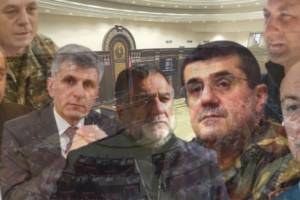Britain has agreed to repatriate a woman and five children from camps in Syria, the second time the UK has allowed an adult to return since the end of the ground war against Islamic State more than four years ago.
The release was announced by the Kurdish administration that controls north-east Syria – but a human rights group and a former minister accused the UK of lagging behind other western nations in allowing families who lived under IS to return.
A Syrian news agency reported that the woman and children, understood to be from multiple families, were handed over on Saturday to a group of British officials. All those released hold UK nationality.
Robel Baho, deputy co-chair of the Syrian Kurdish administration’s foreign relations department, called on the international community “to urgently” facilitate further repatriations of people who, in most cases, have been held for four or five years.
France has repatriated more than 160 children and more than 50 women, while Germany has taken back almost 100 women and children, but Britain has been among the slowest in helping tackle the problem.
Maya Foa, the executive director of Reprieve, which assists Britons detained in north-east Syria, welcomed the development but complained that other “British families are still being held in desert prison camps because of UK government inaction”.
Foa warned that “British children are growing up in dangerous tent cities patrolled by men with guns” and accused the UK of presiding over a “cruel, counterproductive, politically motivated policy” which she said stood out among western nations.
It is estimated there are about 20-25 women or families with British nationality still held in Syrian camps, plus a number of others whose citizenship was removed and who are now fighting that decision in the UK courts. The most notable of those is Shamima Begum, whose case is now before the court of appeal.
Ten or more children with British parents, mainly orphans and unaccompanied minors, have been allowed to return since 2019, but only one other adult, a woman, has been repatriated. That took place in October 2022.
Britain has said it makes repatriation decisions on “a case by case basis” although the rationale in each instance is not always clear.
Former cabinet minister David Davis said British allies including Australia, Canada, France and Germany had all begun repatriating their nationals. It was, he argued, “the only sensible solution”, but “the UK is alone in abdicating its responsibility”.
If necessary, Davis said, British authorities could prosecute a returnee for terror offences in the UK if it was believed they posed an ongoing threat to national security.
Begum has said she would be willing to stand trial, if the UK wanted to charge her for being a member of the terror group.
Hundreds of women and children were picked up by Syrian Kurdish ground forces as IS was defeated in 2019 by a coalition that involved the US and the UK. Many had travelled from abroad to live under what the terror group said was an Islamic caliphate, although Reprieve argues many of the women were effectively trafficked.
The Foreign Office has been approached for comment.
Source: The Guardian





